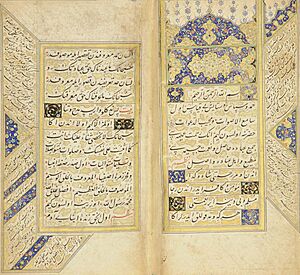Ebussuud Efendi facts for kids
Quick facts for kids
Ebussuud Efendi
al-Mu'allim al-Thani (The Second Teacher)
|
|
|---|---|

An early copy of Ebussuud's Du'anama ("Book of Prayers"), signed Muhammad Amin al-Husayni al-Tirmidhi, created in Ottoman Turkey, dated 1599–1600
|
|
| Ottoman Shaykh al-Islām | |
| In office October 1545 – 23 August 1574 |
|
| Monarch | |
| Preceded by | Fenarîzade Muhyiddin Çelebi |
| Succeeded by | Çivizade Damadı Hamid Efendi |
| Kazasker of Rumelia | |
| In office August 1537 – October 1545 |
|
| Monarch | Suleiman I |
| Preceded by | Muhyiddin Efendi |
| Islamic Judge (Kadi) of Istanbul | |
| In office November 1533 – August 1537 |
|
| Monarch | Suleiman I |
| Personal details | |
| Born |
Mehmed Ebussuud El- İmadi bin Mutasavvıf Muhyiddin Mehmed
30 December 1490 İskilip, Rûm Eyalet, Ottoman Empire |
| Died | 23 August 1574 (aged 83) Ḳosṭanṭīnīye, Ottoman Empire |
| Spouse | Zeyneb Hanım |
| Parent | Mutasavvıf Muhyiddin Mehmed (father) |
Ebussuud Efendi (born December 30, 1490 – died August 23, 1574) was a very important legal expert in the Ottoman Empire. He was known as a Hanafi Maturidi jurist, which means he followed a specific school of Islamic law and theology. He also studied and explained the Quran.
Ebussuud held several key positions during his life. He served as a judge in Istanbul from 1533 to 1537. Later, he became the Shaykh al-Islām of the Ottoman Empire, a very high-ranking legal official, from 1545 until his death in 1574. His family came from a village called Imâd, near İskilip, which is why he was also known as "El-İmâdî."
Contents
Early Life and Career
Ebussuud Efendi's father was Iskilipli Sheikh Muhiddin Muhammad Efendi. Ebussuud followed in his father's footsteps, becoming a respected scholar.
Becoming a Judge
In the 1530s, Ebussuud started his career as a judge. He worked in important cities like Bursa and Istanbul. He also served as a judge in Rumelia, a large region of the Ottoman Empire.
Making Laws Fair
As a judge, Ebussuud worked to make sure that local laws matched sharia, which is Islamic divine law. This was an important task to keep the legal system consistent across the empire.
Rise to Shaykh al-Islām
Ebussuud's skills and knowledge were noticed by Suleiman the Magnificent, one of the most powerful Ottoman Sultans.
The Highest Legal Office
In 1545, Sultan Suleiman promoted Ebussuud to the position of Shaykh al-Islām. This was the supreme judge and the highest legal official in the entire Ottoman Empire. Ebussuud held this powerful role until he passed away. He made the office of Shaykh al-Islām very influential during his time.
Working with the Sultan
Ebussuud worked very closely with Sultan Suleiman. He gave legal opinions, called fatwās, that helped support the Sultan's important decisions. These opinions helped ensure that the Sultan's actions were seen as following Islamic law. He continued this work with Suleiman's successor, Selim II.
Legal Opinions on Religious Groups
Ebussuud also issued legal rulings about different religious groups. For example, he gave opinions about the Qizilbash, a group with different beliefs. His rulings helped define their status within the Ottoman legal system.
Reforming Ottoman Law
Ebussuud Efendi played a huge role in changing the Ottoman legal system. He worked with Sultan Suleiman, who was known as the "Lawgiver" because of his many legal reforms.
Combining Laws
Together, Ebussuud and Suleiman reorganized Ottoman law. They created a new legal system that combined sharia (Islamic law) with the Ottoman administrative code, known as qānūn. This made the laws clearer and more organized.
Sultan's Authority in Law
Before Ebussuud, many believed that judges could interpret sharia freely, and that even the ruler had to follow it. But Ebussuud changed this. He created a system where the power of judges came from the Sultan. This meant judges had to follow the Sultan's qānūn-nāmes (law-letters) when applying the law. This gave the Sultan more control over the legal system.
Famous Legal Opinions
Besides his big legal reforms, Ebussuud is also remembered for the many different fatwās he issued. These were legal opinions on various everyday matters.
Everyday Life Rulings
Some of his most famous opinions allowed things that were new at the time. For instance, he gave rulings that permitted Karagöz and Hacivat plays, which were popular shadow puppet shows. He also allowed the drinking of coffee, which was a new trend. These opinions showed his practical approach to law.
Money Matters
Ebussuud is also known for a fatwā that allowed certain money dealings involving riba (interest). This opinion was debated by many, but it is often mentioned by modern Muslim thinkers today.
 | Stephanie Wilson |
 | Charles Bolden |
 | Ronald McNair |
 | Frederick D. Gregory |

